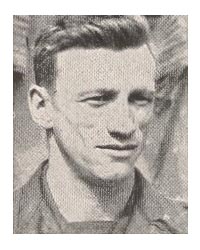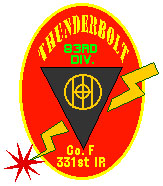

The Shonak Letters

They Will Never Be Forgotten
January 04, 2001
Mr. Curry: Greetings Sir and Happy New Year.
From Col. James D. Shonak, former Commander Anti-Tank Company 331st/ 83rd Division. For the past 87 years, I have made Springfield, MA my home. After the war, although Col. York wanted me to reenlist and take over the regiment, I declined and resigned my command after the hell we had been through. The Army instead requested that I take over command of a reserve school in Chicopee, MA, which I ran for 42 years.
If interested, Shonak is 5th from the right in the front row in the photo taken at Camp Breckenridge, Kentucky.
I appreciate all those who I served with. My men were the very best. You sir can be very proud of Tom. I am. Those boys of the 83rd are heroes not only to this country...but of the entire free world. Their sacrifice will live on forever after we are long gone. They will never be forgotten, ever.
Regards
Shonak
The Beginning of the Beginning: Experiences of the 83rd Division
April 18, 2001
Dear Mr. Curry:
Apologize for so long in returning a response. I have been ill for a long time and am not getting better. I am pushing myself to do this. My son-in-law is taking my dictation. It is impossible to remember back then...old age and things you're not allowed to remember...I can't begin to explain it all...so God awful horrific...so permanent...our lives changed completely moment to moment. Staggering loss of life. Afraid to make relationships just to protect yourself because you knew your job was to give yours up.
We (331st - F Company) received orders to proceed to France from England to relieve the paratroopers (101st Airborne). They had landed by air and were holding the area....and we were supposed to land by boat to relieve them pronto and use the element of surprise. Then we were supposed to organize for the attack and obliterate the enemy and proceed on attacking forward without stopping. We encountered a big storm in the English channel for 6 days and we could not land. Most of the men were sick as dogs...they couldn't or wouldn't eat. Instead of preparing (psychologically), we were becoming physically worse. Losing weight, and strength...tossing out food...all the while the paratroopers were trying to hold on to their position and needed us there. The men were sick although a few could eat. Then of all things...we started running out of food for the few that could eat! What a mess...and we had not even landed yet! Christ! I contacted regimental HQ and told them in no uncertain terms "Get me food or get me the hell out of here immediately!...My men are in lousy condition...I got to get off this damn floating sick bay. I've now got the healthy ones getting sick because everyone around them is sick with so much vomiting taking place." I received word back from regimental HQ and they got us into small boats that carried 10 per boat. Finally after 6 days we landed...the element of surprise of our arrival was completely lost.
We got out of the boats and walked through water to get to the sand. Everything in sight (wharves) had been destroyed by the storm. Soaked to the knees, we walked to the secure location where they were holding their position. We had to attack through them. We did have air support but suffered causalities. As infantry company commander, I had 200 plus men I was responsible for. Every time I lost a man, a piece of me went with him. Going through town after town, the losses mounted. We encountered sniper fire, booby traps, artillery fire but the Germans were withdrawing because we were overwhelming them. We reorganized after we had taken multiple towns and received additional support units. We became under the command of regiments. We received 12 anti tank guns, and additional artillery along with supplies and more replacements.
They were using damn air bursts and slaughtering us. They shot an air burst at my jeep with my driver in front with me and a rifleman in back. They blew us out of the jeep and I received shrapnel in my leg. The driver had his hand ripped open by the shrapnel and the rifleman got thrown out as well and headed for cover. Under the cover of darkness, we discovered that the jeep was a total loss and we ran into the woods and proceeded to headquarters and requested another jeep to get back to the unit.
The rifleman needed permanent rest and was sent back and replaced. We were always very careful to cover our rank due to the sharpshooters. Any group of 3 or more was an inviting target...and they always opted for the rank. I tried to keep my men no closer than 8 feet from me. I covered myself with mud...and nothing that shined.
I'm not feeling very well...need to take a break. This is tough and exhausting.
All my best for now.
Shonak
To the Hedgerows
May 24, 2001
Dear Mr Curry:
Please give First Sergeant Terhanko my best...the name sounds familiar but I can't picture the face. Sorry for the confusion...I'm trying to piece together events that I can remember that I believe you might be interested in that your father was directly involved with and sacrificed for.
I was ordered to take over the Anti-Tank Company while it was being formed at Camp Breckenridge. When we headed for England we were with a number of companies that we supported in the regiment...and F Company was one that we were with. The ships we crossed on were large...so it was natural that many different companies boarded together on the same boat. We crossed with and supported among others F Company. When we hit France, they split my company up (both of which I was still responsible for) to support two forward battalions, which contained 3 or more companies each...one of which contained F Company.
Although we attempted to train for the hedgerows back in the States, it was of questionable usefulness. IT WAS THE MOST GOD FORSAKEN, UNFORGIVING, MURDEROUS TERRAIN THAT I EVER ENCOUNTERED AND FOUGHT ON. THE BODY COUNT TESTIFIES TO THAT. The Germans were intelligent, cunning, strong willed and resourceful. Nobody was ready for what lay ahead of us...including upper command. Each individual hedgerow was in and of itself it's own separate battle. Nobody seems to get this right Dave. It could take a day to control and secure the next row...or it could take 3 days...depending on what was on the other side and how established the territory was the Germans were occupying. Dave, understand that when we entered a strong occupied area (many times unaware), we were dealing with snipers, mines, booby traps, strong artillery and...GERMAN TUNNELS all over the goddamn place. One minute they are in front of you and you're preparing with recon to advance forward...and the next minute, all hell is breaking loose because you suddenly realize you're surrounded and artillery is pouring down on you and you're getting slaughtered screaming for support with no idea how badly you have been hit and who and what you've lost. In fact, many times whole areas were set up by the Germans for us to come into and take us out by priority. First...heavy armor; second...anti tank guns; third...jeeps and movables; fourth...machine gunners and fifth...everything and everyone else. God we lost a lot of men. My worst nightmares are still in those rows.
To say that the hedgerows were difficult to maneuver through (as TV documentaries do) is an understatement to say the least. They were high rows of whatever the farmers had planted (corn, apple trees, bushes and vines of grapes, grain and vegetation, etc.), with rows between each to barely drive through. There were row upon row of hedgerows. Miles of them. They could be 10 feet or 30 feet wide...thick with vegetation...and you did not know what or whom was on the other side, and only feet away. You can be on top of the enemy and not even realize it. You listen for sounds and sense for human. And they're doing the same. So, even to be safe, you would lob over hand grenades to wipe them out. Grenade launchers were also used. Airbursts were also used to shoot over the hedge to shower hot metal. We had to be careful that we didn't hit any of our own reconnaissance men. If you're fortunate to have accurate air reconnaissance to find where they are first, you can more quickly advance...but you still run into small pockets of enemy without armor or anti-tank that would take you by surprise and lead to the loss of some your best men up front. We tried to get a soldier in a tree to scope the area if we could keep him secure and protected.
Dave, you didn't go around hedgerows because they went on and on and on and on. You have to go through. Here's how...you reconnoiter and find an area of least enemy resistance or occupation...or you guessed. You quickly and quietly plant explosives in the hedgerow to blow an area up big enough to get movables through. Please remember...when you detonate, you give your position away to the enemy so you better have a good plan and support because enemy heavy artillery will be moments away. You get machine gunners and riflemen on both sides of the position to be blown with heavy armor and anti-tank hidden by brush and bramble in back ready to take out an unsuspecting Nazi tank(s). After you blow the area, you move immediately and push into the next row after it is secured. And quickly move armor and anti-tank positions because they are targets. When you meet up with German tanks, you shoot at the flank of the tank, or shoot out a tread. The underbelly of the tank, the weakest point, was generally taken care of with a mine.
You ALWAYS tried to protect your flank and rear with reserve squads or a platoon including machine guns, to keep the Germans from sneaking up on you from behind...which they tried over and over. You might need a company (200 men) or a platoon (60 men), depending on what the circumstance was. You might need a squad to go out and reconnoiter. I had big, high velocity anti-tank guns that we would use often.
When dealing with enemy on foot, we blow away part of the hedgerow to cut through, you then send over airbursts or artillery, or set up a machine gun on a hump or behind brush, to fire at the German soldiers scurrying or under cover before our men would go through. If we suspected Germans to be in the trenches or behind a wall, we would send airbursts and/or artillery fire would be called. You can explode it with a cannon or a bazooka. Once the area was cleared, the riflemen would go first(quicker), with support from machine gunners. Then the grenade launchers would go next. Anti-tank would go if they suspected any tanks or vehicles with armor. When we didn't want to be seen by anybody, we would also use smoke to hide where we were and what we were doing. Your dad and the rest of us moved on our hands, knees and bellies and lived and slept in trenches for cover and lived on cold rations. Having the enemy so close was nerve racking. It tested your head and worked on you like nothing else. They were so close.
I am tired. This is difficult to relive. I hope this helps. What do you want to know more of? Let me know.
All my best.
Shonak